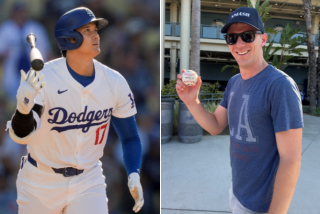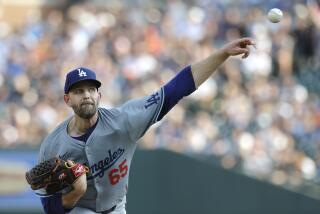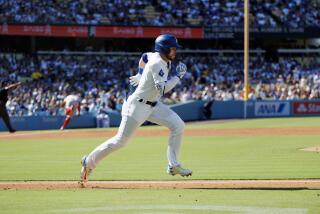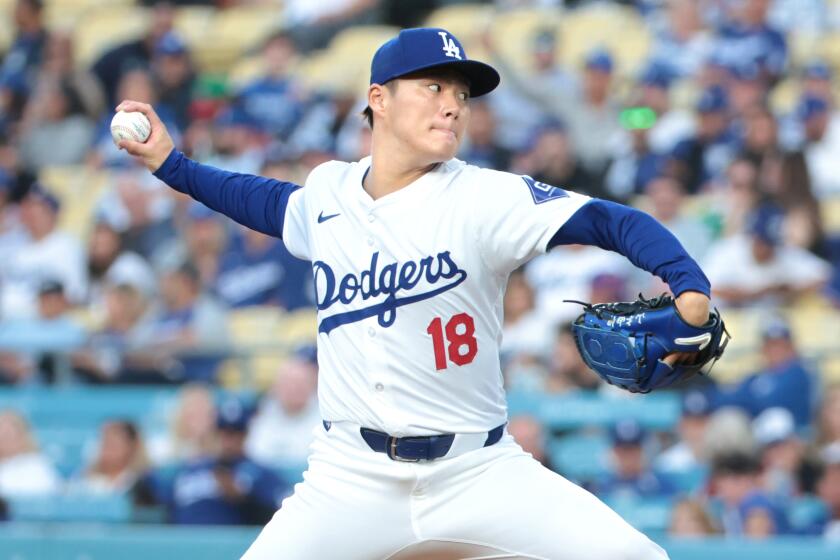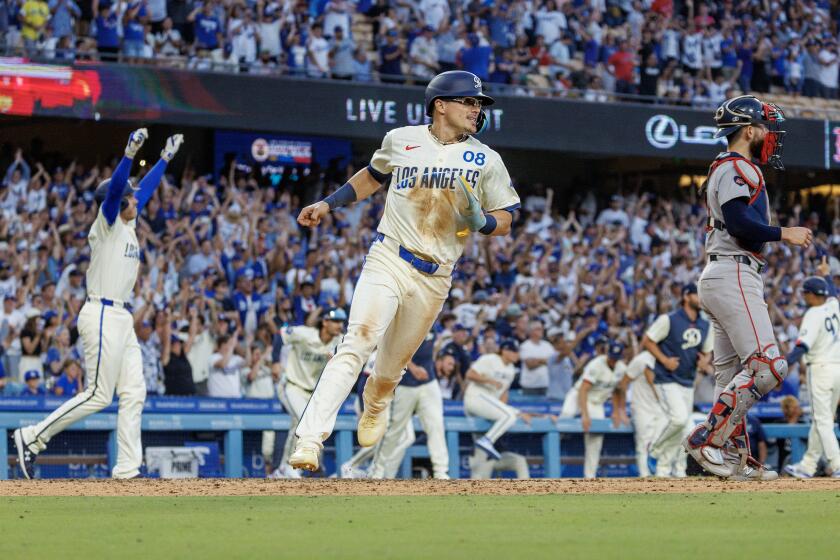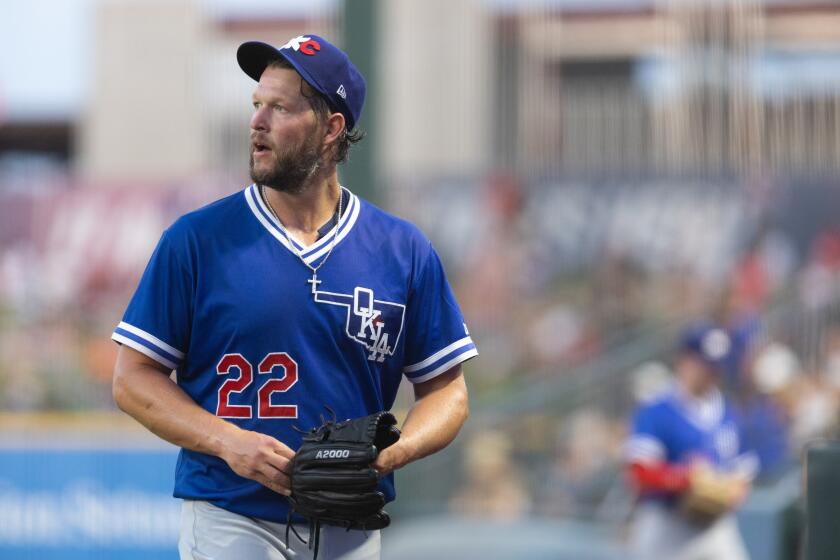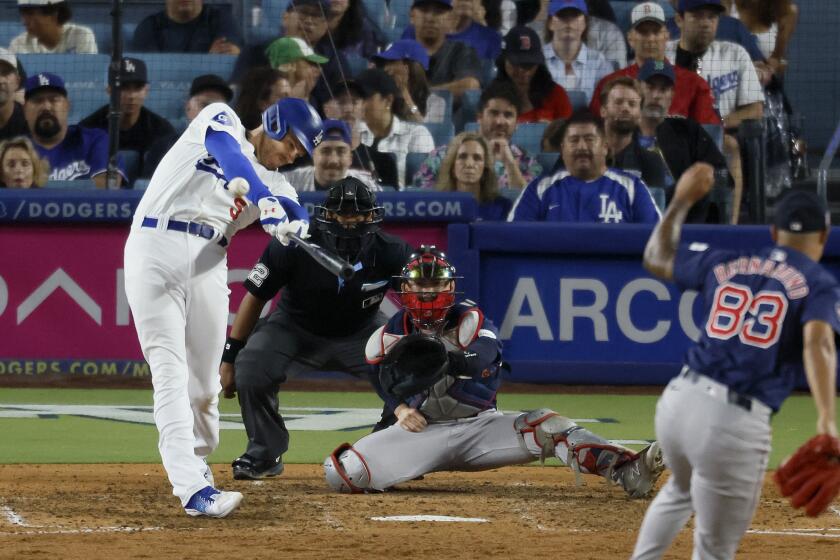Honing Dodger Hitters of Future : Ex-Slugger Reggie Smith Proves Teaching Can Be Two-Edged Sword
Heads turned when Reggie Smith, flourishing a samurai sword, entered the Bakersfield Dodgers’ clubhouse.
“I thought he was going to cut somebody’s head off,” said outfielder K. G. White.
But Smith was not thinking decapitation. He simply was going to take a few cuts with the sword before batting practice.
A former Dodger slugger, Smith is in his first season as a roving hitting instructor for the Dodgers’ minor league teams in Bakersfield; San Antonio; Albuquerque, N.M.; Great Falls, Mont., and Salem, Ore.
And the ceremonial sword is an instructional tool Smith uses to teach players the correct way to grip a bat.
“It piques everyone’s curiosity,” Smith said of his sword. “But once they understand what I’m trying to do, then they can take it and apply it to what they’re trying to do with a baseball bat.”
Where did Smith get the idea of using a sword to teach hitting?
He got it in Japan, where he spent two seasons with the Tokyo Giants at the end of his playing career in 1983 and ’84. Sadaharu Oh, the great Japanese home run hitter, who was Smith’s manager there, practiced with a 600-year-old samurai sword.
Fans stopped to stare while Smith tutored a player in the batting cage before a recent game here.
“Look, it’s kung fu batting practice,” a boy shouted as a player gripped the sword.
Smith’s unusual teaching methods have apparently worked for Bakersfield, which won the first-half championship in the California League, its first title since 1984. The Class A Dodgers had 10 of the 24 players in the league’s All-Star game.
Tim Johnson, Bakersfield manager, credits Smith with improving the team’s hitting.
“To me, Reggie Smith is the finest hitting coach I’ve ever been around,” Johnson said. “I played for Milwaukee for six years and I thought Harvey Kuenn (the late Brewer coach and manager) was the best hitting coach, but Reggie is better.
“Reggie relates to the kids well. He was a superstar, but he gets down on their level.”
The Bakersfield Dodgers, a team composed mainly of players in their second year of pro ball, lead the California League in batting with a team average of .260.
“We lead the California League in hitting due largely to Reggie’s help,” said Guy Conti, a Bakersfield coach. “He’s been a tremendous asset to us. He really communicates well with the players.”
First baseman Eric Karros, a former UCLA player, leads the league with a .317 average, and shortstop Jose Offerman was third with a .306 average before he was promoted to San Antonio, a double-A team.
Karros said: “A lot of hitting coaches just generalize and say everybody needs to do this or that, but Reggie breaks down everybody personally. And I think that’s what makes him successful.
“He works toward your strength. He doesn’t generalize. He knows what worked for him isn’t going to work for everybody.”
Outfielder Braulio Castillo, who has perhaps the quickest bat in the Dodger minor league system, leads the league with 60 runs batted in. Castillo is one of Smith’s projects. Smith has been trying to get Castillo to hit to the opposite field and rewards Castillo with a steak dinner for every opposite-field hit.
“Reggie helps me a lot,” Castillo said. “He’s teaching me to hit the curveball and to stay back in the box.”
Smith displays the same work ethic as a batting instructor that he maintained as a player.
He gives each player individual attention in the batting cage before games, analyzing their swings, stances and balance. During games, he charts his hitters.
Smith stresses that the most important part of hitting is psychological.
“I’ve always said the toughest ballpark to play in is the one with the five-inch fences,” Smith said, tapping his fingers against his head. “There are certain natural movements that your brain has been telling your body to do ever since you were born. You have to listen to your brain.”
If a player is struggling, Smith goes over videotapes to diagnose the problem, followed by a session at the batting cage.
Eric Boddie, a Bakersfield outfielder battling a slump, worked with Smith before a recent game.
“I’m ready for my whippin,’ Reggie,” Boddie said as he greeted Smith in the clubhouse.
While watching a videotape of Boddie batting, Smith instantly noticed that Boddie had been collapsing his left knee before swinging.
Smith took Boddie to a batting cage and pitched underhanded to Boddie until shortly before the game. A group of players watched as Smith worked with Boddie, hoping to pick up tips.
‘Reggie relates well to us,” said Boddie. “Most of us grew up watching him play. Talking to him is like talking to your older brother.”
Although Smith, 44, seems to enjoy his camaraderie with the young Bakersfield Dodgers, bantering with players before and after games, he is able to maintain a teacher-student relationship while instructing them.
“I’ve always thought of myself as a teacher,” Smith said. “There’s a difference between being a teacher and a coach. I have a lot of my own theories that I’ve developed and feel will help the hitters. But a coach primarily implements somebody else’s program. I’m a teacher.”
Smith had some good teachers, too.
While he was a rookie with the Boston Red Sox, his hitting coach was Ted Williams.
“He used to call me ‘Bush,’ ” Smith said. “I don’t think he ever called me by my real name.”
Spotting a potential hitting star, Williams spent extra time working with Smith.
“He would ask me where each pitch was,” Smith recalled. “I’d say it was about an inch outside, and he’d jump all over me. He said if you didn’t know where the pitch was, how do you expect to hit it?
“The biggest thing I learned from Ted Williams was that when I was hitting, it wasn’t me against the pitcher, it was me against the baseball.”
Williams apparently taught Smith well.
A switch-hitting power hitter, Smith compiled a career average of .287 with 314 home runs and 1,092 RBIs in 17 seasons with the Red Sox, St. Louis Cardinals and Dodgers. He helped the Red Sox win the American League pennant in his rookie season, 1967, and was the catalyst as the Dodgers won the National League championship in 1977 and 1978, his first two seasons with the club. Smith also helped the Dodgers win the 1981 World Series.
Although he has been out of the majors since 1982, Smith can still hit. He had a double and a single in a recent old-timers’ game at Dodger Stadium.
“I didn’t retire because I couldn’t hit,” he said. “I retired because I was tired of getting into shape to play.
“I wanted to spend more time with my kids and I was starting to think about other things and my concentration was starting to wane. I knew it was time to get out.”
His future secure after earning $2 million for playing the two seasons in Japan, Smith opened a successful computer-supply business after retiring in Los Angeles in 1984.
Why did Smith return to baseball?
After being contacted by the black baseball coalition, an organization of former major league players who seek to get more blacks involved in baseball management, Smith called the Dodgers.
“I didn’t really think that the Dodgers would have any openings,” Smith said. “I thought I’d make the call just to satisfy the black baseball network.”
But there was an opening because Willie Davis, the Dodgers’ minor league hitting instructor last season, had taken a job in the club’s speakers’ bureau.
So Smith was hired.
“I found out that I’d been suppressing an urge to teach hitting,” Smith said. “I had been teaching hitting to kids on a private basis and I when I got back into (organized) baseball, I realized how much fun I’d been missing.”
Fred Claire, Dodger executive vice president, thinks Smith has done a good job.
“We were fortunate to hire Reggie because he knows hitting,” Claire said. “He knows every aspect of the game. And he has great intelligence for the game and many things beyond. I’m very pleased that he’s with us.”
Smith also handles special assignments for the Dodgers.
He recently joined the Dodgers in San Diego to tutor slumping outfielder John Shelby.
“I had to work in reverse with him. I asked him how he wanted to hit and he was receptive to that. I knew we were on the right track.”
Working with the Dodgers’ minor league players, however, remains Smith’s primary job.
“I get a thrill watching the young players develop,” he said. “I want them to get (to the majors). That’s my reward.”
More to Read
Are you a true-blue fan?
Get our Dodgers Dugout newsletter for insights, news and much more.
You may occasionally receive promotional content from the Los Angeles Times.
